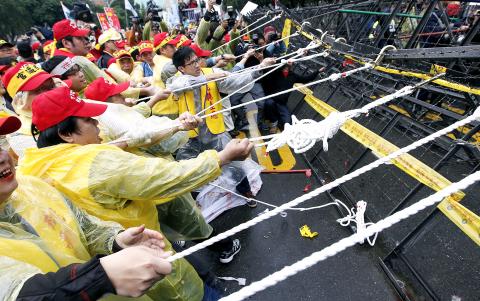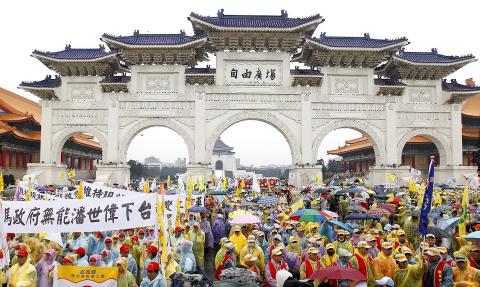Tens of thousands of workers took to the streets of Taipei yesterday in Workers’ Day protests, calling on the government to protect their rights.
The protesters called on the government to retain the current labor insurance annuity payment, systematically raise the minimum wage, establish a system of collective bargaining, allocate a budget to supplement the Labor Insurance Fund if it fails to provide the basic guaranteed payments and amend Article 28 of the Labor Standards Act (勞動基準法) to include doctors.
They also urged legislators across party lines to reject the Cabinet’s pension reform plan — which proposes a higher premium rate and a lower income replacement rate — so that workers can have basic retirement guarantees.

Photo: REUTERS
Singing The Internationale, the Laborers’ Fight Song and several other classic songs of the labor movement, about 20,000 workers from unions and labor rights advocacy groups across the country marched from outside the Legislative Yuan to the Executive Yuan.
“Workers from different places and different industries are gathered here to speak out about their discontent with the government,” march spokesman Han Shih-hsien (韓仕賢) said. “Although different groups may have different complaints to make, our collective concern is the labor insurance reform.”
As the Labor Insurance Fund is estimated to be broke within 20 years, the government has decided on a reform plan that would ask those who are currently employed to pay more in premiums, while cutting retirement payouts for those who are retired.

Photo: REUTERS
“This so-called reform is a false reform, because it’s giving less protection for workers in retirement,” Han said.
The demonstrators first rallied outside the Legislative Yuan and invited all political party caucuses to promise that they would not support labor insurance reforms that would actually damage the rights of retirees.
While the caucuses of the Democratic Progressive Party, the Taiwan Solidarity Union and the People First Party all sent representatives to sign the promise, the Chinese Nationalist Party (KMT) caucus turned down the invitation.
“The KMT has refused to even see us; they would not bow to workers. We will teach it a lesson and make it bow to us,” Taoyuan County Confederation of Trade Unions honorary chairman Mao Chen-fei (毛振飛) said.
The parade was largely peaceful, but tensions grew when demonstrators found that only rows of barricades and police officers in riot gear awaited them as they arrived in front of the Executive Yuan.
Using hooks and ropes, demonstrators tried to pull down the barricades, which were chained together and nailed to the ground.
The police reacted by poking those who went near the barricades with long bamboo poles. The conflict continued for about 10 minutes until Mao asked demonstrators to stop, saying that several demonstrators were injured during the conflict.
Still upset, demonstrators chanted slogans calling on Premier Jinag Yi-huah (江宜樺) to come out to meet them, but the Executive Yuan did not respond to the call.
Meanwhile, protesters in another march organized by eight major labor associations also expressed opposition to what they called the government’s improper pension reforms.
The organizers said the real wage has been lowered to the level of 18 years ago, while the pension reform plan is set to deduct even more of workers’ earnings and will not only increase the labor insurance premium rate, but also other fees by 20 percent.
Separately yesterday, President Ma Ying-jeou (馬英九) called for more understanding of the government’s pension reforms and said the government will continue to communicate with workers to protect their rights.
“President Ma understands workers’ concerns about the pension reform plan and wishes them to know that the labor pension reforms seeks to strengthen the financial structure of the Labor Insurance Fund for future generations,” Presidential Office spokesperson Lee Chia-fei (李佳霏) said.
“President Ma said that rallies reminded the government of what it can do better. The government will keep the laborers’ wishes in mind,” Lee added.
Additional reporting by Mo Yan-chih and CNA

AIR SUPPORT: The Ministry of National Defense thanked the US for the delivery, adding that it was an indicator of the White House’s commitment to the Taiwan Relations Act Deputy Minister of National Defense Po Horng-huei (柏鴻輝) and Representative to the US Alexander Yui on Friday attended a delivery ceremony for the first of Taiwan’s long-awaited 66 F-16C/D Block 70 jets at a Lockheed Martin Corp factory in Greenville, South Carolina. “We are so proud to be the global home of the F-16 and to support Taiwan’s air defense capabilities,” US Representative William Timmons wrote on X, alongside a photograph of Taiwanese and US officials at the event. The F-16C/D Block 70 jets Taiwan ordered have the same capabilities as aircraft that had been upgraded to F-16Vs. The batch of Lockheed Martin

US President Donald Trump yesterday announced sweeping "reciprocal tariffs" on US trading partners, including a 32 percent tax on goods from Taiwan that is set to take effect on Wednesday. At a Rose Garden event, Trump declared a 10 percent baseline tax on imports from all countries, with the White House saying it would take effect on Saturday. Countries with larger trade surpluses with the US would face higher duties beginning on Wednesday, including Taiwan (32 percent), China (34 percent), Japan (24 percent), South Korea (25 percent), Vietnam (46 percent) and Thailand (36 percent). Canada and Mexico, the two largest US trading

GRIDLOCK: The National Fire Agency’s Special Search and Rescue team is on standby to travel to the countries to help out with the rescue effort A powerful earthquake rocked Myanmar and neighboring Thailand yesterday, killing at least three people in Bangkok and burying dozens when a high-rise building under construction collapsed. Footage shared on social media from Myanmar’s second-largest city showed widespread destruction, raising fears that many were trapped under the rubble or killed. The magnitude 7.7 earthquake, with an epicenter near Mandalay in Myanmar, struck at midday and was followed by a strong magnitude 6.4 aftershock. The extent of death, injury and destruction — especially in Myanmar, which is embroiled in a civil war and where information is tightly controlled at the best of times —

China's military today said it began joint army, navy and rocket force exercises around Taiwan to "serve as a stern warning and powerful deterrent against Taiwanese independence," calling President William Lai (賴清德) a "parasite." The exercises come after Lai called Beijing a "foreign hostile force" last month. More than 10 Chinese military ships approached close to Taiwan's 24 nautical mile (44.4km) contiguous zone this morning and Taiwan sent its own warships to respond, two senior Taiwanese officials said. Taiwan has not yet detected any live fire by the Chinese military so far, one of the officials said. The drills took place after US Secretary